One of the fun things for us about being away–besides meeting so many faithful and friendly customers on the road—is returning to a batch of books that have just been released. Being with CLS and CCO took us off site for a while. Coming home to a week’s worth of new titles is like Christmas in October. The crazy snow makes it feel that way, too, but that is another story.
Here are 12 brand new ones, briefly highlighted. Notice the 20% off BookNotes special and our handy order form link at the end.
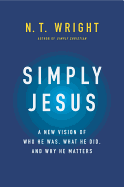 Simply Jesus: A New Vision of Who He Was, What He Did, and Why He Matters N.T. Wright (HarperOne) $24.99 I listened to some old N.T. Wright audio CDs this week and seeing this new book promising to “unleash the full story of Jesus” made me so eager to read more. I suspect he has said much of this before and it is written in a way to follow up Simply Christian. He has a way of distilling erudite scholarship, making it understandable and helpful. As Rowan Williams puts it, it is “yet another of his great gifts to the worldwide church.” If you haven’t read Wright on Jesus (Following Jesus is a wonderful collection of sermons; Challenging Jesus is a masterful summary of the first three volumes of his magisterial “Christian Origins and the Question of God” series) this would be a great introduction. By the way, as he says in the forward, there is new material here, too—“twists and turns” that he was unaware of when working on his previous books on Jesus. This is not a simple adaptation, but fresh, good kerygma.
Simply Jesus: A New Vision of Who He Was, What He Did, and Why He Matters N.T. Wright (HarperOne) $24.99 I listened to some old N.T. Wright audio CDs this week and seeing this new book promising to “unleash the full story of Jesus” made me so eager to read more. I suspect he has said much of this before and it is written in a way to follow up Simply Christian. He has a way of distilling erudite scholarship, making it understandable and helpful. As Rowan Williams puts it, it is “yet another of his great gifts to the worldwide church.” If you haven’t read Wright on Jesus (Following Jesus is a wonderful collection of sermons; Challenging Jesus is a masterful summary of the first three volumes of his magisterial “Christian Origins and the Question of God” series) this would be a great introduction. By the way, as he says in the forward, there is new material here, too—“twists and turns” that he was unaware of when working on his previous books on Jesus. This is not a simple adaptation, but fresh, good kerygma.
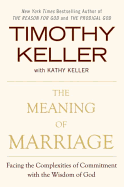 The Meaning of Marriage: Facing the Complexities of Commitment with the Wisdom of God Tim Keller (Dutton) $25.95 I have not read much of this yet but it is a winner, no doubt. The footnotes are intriguing, the text nearly beautiful at times, the feel of the attractive hardback very fine. This originates in a sermon series the Reverend Keller preached in his solid New York congregation although some portions have been co-authored by his wife Kathy. It is more intellectually substantive than most religious books on marriage and it is surely a deeper look than some might be used to. But, as always, Keller is a master of speaking wisely into an urbane and sophisticated culture of younger professionals and he is more than willing to speak truth to power. This is an honest, intellectually-engaging, clear-headed book on how serious Biblical insight could have vast implications for our day-to-day marriage and family relations. Not in a relationship? No matter, this is important gospel-centered stuff, well thought through. A must read.
The Meaning of Marriage: Facing the Complexities of Commitment with the Wisdom of God Tim Keller (Dutton) $25.95 I have not read much of this yet but it is a winner, no doubt. The footnotes are intriguing, the text nearly beautiful at times, the feel of the attractive hardback very fine. This originates in a sermon series the Reverend Keller preached in his solid New York congregation although some portions have been co-authored by his wife Kathy. It is more intellectually substantive than most religious books on marriage and it is surely a deeper look than some might be used to. But, as always, Keller is a master of speaking wisely into an urbane and sophisticated culture of younger professionals and he is more than willing to speak truth to power. This is an honest, intellectually-engaging, clear-headed book on how serious Biblical insight could have vast implications for our day-to-day marriage and family relations. Not in a relationship? No matter, this is important gospel-centered stuff, well thought through. A must read.
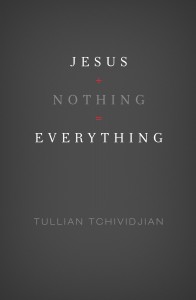 Jesus + Nothing = Everything Tullian Tchividjian (Crossway) $18.99 While we were in the Chicago suburbs at the Christian Legal Society conference last week I drove to Crossway’s offices to snag a few of these, having heard they were just shipping. The nice stack here on our “new book” release table makes me happy—Billy Graham’s grandson is smart and very cool and an excellent writer. His books strike me as gutsy and real and loaded with grace. If you picked up his outstanding Unfashionable or the one on Jonah (Surprised by Grace) you’ll know his finely tuned ability to relate faith to vibrant, culturally engaged living, but always out of a gospel-centered life. The title says it (almost) all, and his ruminations here look very, very helpful. Steve Brown suggests (well, really, he probably booms) “If you give a book to anybody this year, give this book. If you yearn for awakening in the church, underline this book and share what you’ve learned.” Very good advice.
Jesus + Nothing = Everything Tullian Tchividjian (Crossway) $18.99 While we were in the Chicago suburbs at the Christian Legal Society conference last week I drove to Crossway’s offices to snag a few of these, having heard they were just shipping. The nice stack here on our “new book” release table makes me happy—Billy Graham’s grandson is smart and very cool and an excellent writer. His books strike me as gutsy and real and loaded with grace. If you picked up his outstanding Unfashionable or the one on Jonah (Surprised by Grace) you’ll know his finely tuned ability to relate faith to vibrant, culturally engaged living, but always out of a gospel-centered life. The title says it (almost) all, and his ruminations here look very, very helpful. Steve Brown suggests (well, really, he probably booms) “If you give a book to anybody this year, give this book. If you yearn for awakening in the church, underline this book and share what you’ve learned.” Very good advice.
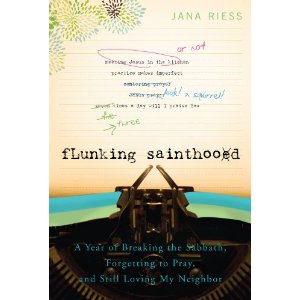 Flunking Sainthood: A Year of Breaking the Sabbath, Forgetting to Pray, and Still Loving My Neighbor Jana Riess (Paraclete) $16.99 Riess has edited a bunch of books, reviewed oodles others (and penned the very odd What Would Buffy Do? which was one of the very first vampire-related books I ever read part of.) This new memoir is fabulous–really, really good on a number of levels. The back cover calls it wry, but I’ve been reading through my advanced copy and it is more than wry, it is hilarious! And very wise. It has endorsements by A. J. Jacob (and if you haven’t read The Year of Living Biblically yet, drop everything and send us an order asap.) Lauren Winner writes of this that is is “the best book on the practices of the spiritual life that I’ve read in a long, long time.” A vulnerably shared, real story—see the fine print of her mishaps and failed efforts on the top of the cover to get a sense of what it’s like. Note, too that “sainthood” is misspelled on the cover art. Ha. Unless you’ve already arrived (and I suppose some of you have) this book will be like an encouraging companion to keep on keeping on. It is a blessed joy, helpful and fun. David Dark calls it “freaking wonderful” and the opening line by Orwell is enough to ponder for a month. I love it!
Flunking Sainthood: A Year of Breaking the Sabbath, Forgetting to Pray, and Still Loving My Neighbor Jana Riess (Paraclete) $16.99 Riess has edited a bunch of books, reviewed oodles others (and penned the very odd What Would Buffy Do? which was one of the very first vampire-related books I ever read part of.) This new memoir is fabulous–really, really good on a number of levels. The back cover calls it wry, but I’ve been reading through my advanced copy and it is more than wry, it is hilarious! And very wise. It has endorsements by A. J. Jacob (and if you haven’t read The Year of Living Biblically yet, drop everything and send us an order asap.) Lauren Winner writes of this that is is “the best book on the practices of the spiritual life that I’ve read in a long, long time.” A vulnerably shared, real story—see the fine print of her mishaps and failed efforts on the top of the cover to get a sense of what it’s like. Note, too that “sainthood” is misspelled on the cover art. Ha. Unless you’ve already arrived (and I suppose some of you have) this book will be like an encouraging companion to keep on keeping on. It is a blessed joy, helpful and fun. David Dark calls it “freaking wonderful” and the opening line by Orwell is enough to ponder for a month. I love it!
 Indescribable: Encountering the Glory of God in the Beauty of the Universe Louie Giglio & Matt Redman (Cook) $14.99 (paperback) and $24.99 (full color coffee table gift edition) Many know Giglio’s passionate young adult worship conferences and even more know, now, the often viewed talk (we sell the DVD) where he invited people to an awesome awareness of God’s immense glory by showing slides of deep space (from Hubble telescopes.) Contemporary worship leader Matt Redman had written about worship, is interested in the awesome hugeness of God, and has a curious interest in science. The two were great as they collaborated in a moving presentation blending science, stunningly artful super-graphics, and of course the powerful songs. The much-anticipated book has released based on those presentations. The gift book is hefty and handsome and the paperback (which still has some b/w outer-space photography) is extraordinary. Get this on your Christmas wish list, or think about who you can share it with. A lot of people are fascinated by science, and many need to be reminded of the great goodness of our awesome Creator. Highly recommended.
Indescribable: Encountering the Glory of God in the Beauty of the Universe Louie Giglio & Matt Redman (Cook) $14.99 (paperback) and $24.99 (full color coffee table gift edition) Many know Giglio’s passionate young adult worship conferences and even more know, now, the often viewed talk (we sell the DVD) where he invited people to an awesome awareness of God’s immense glory by showing slides of deep space (from Hubble telescopes.) Contemporary worship leader Matt Redman had written about worship, is interested in the awesome hugeness of God, and has a curious interest in science. The two were great as they collaborated in a moving presentation blending science, stunningly artful super-graphics, and of course the powerful songs. The much-anticipated book has released based on those presentations. The gift book is hefty and handsome and the paperback (which still has some b/w outer-space photography) is extraordinary. Get this on your Christmas wish list, or think about who you can share it with. A lot of people are fascinated by science, and many need to be reminded of the great goodness of our awesome Creator. Highly recommended.
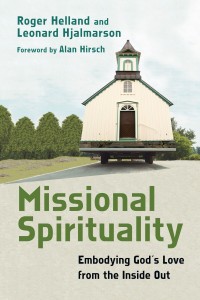 Missional Spirituality: Embodying God’s Love from the Inside Out Roger Helland and Leonard Hjalmarson (IVP) $16.00 Wow, all I can say is wow. I’ve studied the copious footnotes and am delighted at the vast array of fascinating sources, the important books, the astute authors, the edgy social theorists, and solid Bible guys they draw upon. The book is both stimulating and–I trul
Missional Spirituality: Embodying God’s Love from the Inside Out Roger Helland and Leonard Hjalmarson (IVP) $16.00 Wow, all I can say is wow. I’ve studied the copious footnotes and am delighted at the vast array of fascinating sources, the important books, the astute authors, the edgy social theorists, and solid Bible guys they draw upon. The book is both stimulating and–I trul
y believe–helpful as an important corrective to an overly pious, inward sort of spirituality. (And, conversely, an popular rhetoric of being missional that seems too often unhinged from profound spiritual formation and significant church life.) The authors are a Canadian Baptist and an evangelical Mennonite. Alan Hirsch wrote a great forward. Michael Frost declares “This book is a triumph!” Other rave reviews come from Gordon Smith (whose word I always trust), David Fitch, of Northern Seminary, whose End of Evangelicalism puts its printed finger on a ton of important insights about the shifts within evangelicalism) and the popular missional cheerleader, Reggie McNeal. This is certainly one of the most important missional books to date. Kudos to IVP for well written, important and timely insight.
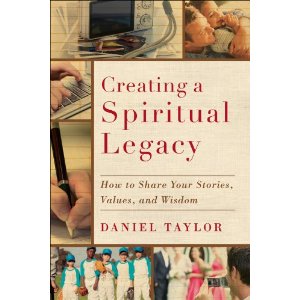 Creating a Spiritual Legacy: How to Share Your Stories, Values, and Wisdom Daniel Taylor (Brazos Press) $14.99 Leave it to Brazos to turn a typical (and sometimes overly sentimental) practice of scrap-booking into a major opportunity for serious theological reflection. Well, the book isn’t really about scrapbooks, per se, but it is about how to discover your own spiritual legacy and story. It helps you learn how to foster a storytelling ethos in your family, church, or organization. Taylor has previously written a marvelous book on how we over-value certainty and another on the role of stories. He has a lovely book called Letters to My Children and here he has combined the insights of them all, lovingly creating a philosophy of storytelling which offers insight into how to discern and communicate the central narratives of our own lives. Endorsements include a fine recommendation by John Wilson (of Books & Culture), the remarkable literature professor, Dale Brown, of the Buechner Institute at King College, campus pastor Ben Patterson (Westmont College) and the always eloquent Calvin Miller. This is a book like no other and should appeal to many BookNotes friends. It deserves to be celebrated for its beauty and unique topic and it deserves to be honored for seriously tackling a very, very important side of life to which we rarely give sustained attention.
Creating a Spiritual Legacy: How to Share Your Stories, Values, and Wisdom Daniel Taylor (Brazos Press) $14.99 Leave it to Brazos to turn a typical (and sometimes overly sentimental) practice of scrap-booking into a major opportunity for serious theological reflection. Well, the book isn’t really about scrapbooks, per se, but it is about how to discover your own spiritual legacy and story. It helps you learn how to foster a storytelling ethos in your family, church, or organization. Taylor has previously written a marvelous book on how we over-value certainty and another on the role of stories. He has a lovely book called Letters to My Children and here he has combined the insights of them all, lovingly creating a philosophy of storytelling which offers insight into how to discern and communicate the central narratives of our own lives. Endorsements include a fine recommendation by John Wilson (of Books & Culture), the remarkable literature professor, Dale Brown, of the Buechner Institute at King College, campus pastor Ben Patterson (Westmont College) and the always eloquent Calvin Miller. This is a book like no other and should appeal to many BookNotes friends. It deserves to be celebrated for its beauty and unique topic and it deserves to be honored for seriously tackling a very, very important side of life to which we rarely give sustained attention.
 In Visible Fellowship: A Contemporary View of Bonhoeffer’s Classic Work Life Together Jon Walker (Leafwood Publishers) $13.99 You may know that Costly Grace (also by Jon Walker) is one of the finest studies of Bonhoeffer’s Cost of Discipleship we’ve yet seen. It walks us through it and explores in very readable prose just how it might apply to our daily discipleship today. Thank goodness that Walker has done this new one. This is one of the only studies (the only one of which I am aware, at least) about Bonny’s great book, Life Together. With the loud and urgent cry for community so ubiquitous these days, and a hunger in our churches to be more relationally supportive, this helpful guide should be a mega-seller. If only. If only we get the word out that Walker is a reliable guide to a true Christian classic. Please help us spread the word.
In Visible Fellowship: A Contemporary View of Bonhoeffer’s Classic Work Life Together Jon Walker (Leafwood Publishers) $13.99 You may know that Costly Grace (also by Jon Walker) is one of the finest studies of Bonhoeffer’s Cost of Discipleship we’ve yet seen. It walks us through it and explores in very readable prose just how it might apply to our daily discipleship today. Thank goodness that Walker has done this new one. This is one of the only studies (the only one of which I am aware, at least) about Bonny’s great book, Life Together. With the loud and urgent cry for community so ubiquitous these days, and a hunger in our churches to be more relationally supportive, this helpful guide should be a mega-seller. If only. If only we get the word out that Walker is a reliable guide to a true Christian classic. Please help us spread the word.
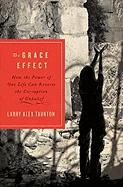 Grace Effect: How the Power of One Life Can Reverse the Corruption of Unbelief Larry Alex Taunton (Nelson) $16.99 There has been a bit of a cottage industry from Christians debating the so-called “new atheists.” Several are quite good and we stock them all. This seems to be a different tack, a thoughtful engagement with the debate, but focused on the documented evidences of the implications of the Christian worldview. “Simply defined, ” he writes, “the ‘grace effect’ is an observable phenomenon–that life is demonstrably better where authentic Christianity flourishes.” The Grace Effect describes the authors debates with Christopher Hitchens, Sam Harris and Richard Dawkins but is anchored in the compelling narrative of a girl named Sasha, a Ukrainian orphan whose life had been shaped by atheistic theorists, and the story of her life’s redemption through the transforming power of God’s grace. Dr. Olivera Petrovich, a research psychologist at the University of Oxford, says of it, “This highly readable book is a collection of powerful insights into the long-term consequences of spiritual indifference and, above all, a remarkable example of how to conquer it.” This is a smart book (laced with wonderful quotes from classic literature from Milton to Dostoesvsky to Huxley to Elliott) but the emotional power of the story of Sasah reminds us that this is a very down to Earth, human story, and story that can change lives and the lives of nations. Here is a short video with the very engaging author telling of a late night dinner with Christopher Hitchens, their trip to the Ukraine to adopt Sasha, and the way the gospel reverberates through lives and cultures. Do check it out and if you want the book, do come back and buy it from us.
Grace Effect: How the Power of One Life Can Reverse the Corruption of Unbelief Larry Alex Taunton (Nelson) $16.99 There has been a bit of a cottage industry from Christians debating the so-called “new atheists.” Several are quite good and we stock them all. This seems to be a different tack, a thoughtful engagement with the debate, but focused on the documented evidences of the implications of the Christian worldview. “Simply defined, ” he writes, “the ‘grace effect’ is an observable phenomenon–that life is demonstrably better where authentic Christianity flourishes.” The Grace Effect describes the authors debates with Christopher Hitchens, Sam Harris and Richard Dawkins but is anchored in the compelling narrative of a girl named Sasha, a Ukrainian orphan whose life had been shaped by atheistic theorists, and the story of her life’s redemption through the transforming power of God’s grace. Dr. Olivera Petrovich, a research psychologist at the University of Oxford, says of it, “This highly readable book is a collection of powerful insights into the long-term consequences of spiritual indifference and, above all, a remarkable example of how to conquer it.” This is a smart book (laced with wonderful quotes from classic literature from Milton to Dostoesvsky to Huxley to Elliott) but the emotional power of the story of Sasah reminds us that this is a very down to Earth, human story, and story that can change lives and the lives of nations. Here is a short video with the very engaging author telling of a late night dinner with Christopher Hitchens, their trip to the Ukraine to adopt Sasha, and the way the gospel reverberates through lives and cultures. Do check it out and if you want the book, do come back and buy it from us.
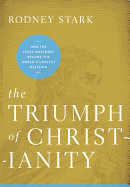 The Triumph of Christianity: How the Jesus Movement Became the World’s
The Triumph of Christianity: How the Jesus Movement Became the World’s
Largest Religion Rodney Stark (HarperOne) $27.99 Several different
scholarly titles showed up while we were away and they are all so
interesting. This, though, deserves special mention, as it is in many
ways a top-shelve, major contribution that will be taken very, very
seriously in the scholarly guilds of religious studies, history and
sociology. Stark has written other major works such as The Rise of
Christianity. He is given rave reviews from popular journals such as
The Christian Century and Christianity Today (who awarded Discovering God, a 2008 book, an Award of Merit.) Stark is the
Distinguished Professor of the Social Science and co-director of the
Institute for Studies of Religion at Baylor University. Just over 500
pages, some of our customers will know this is a must-read.
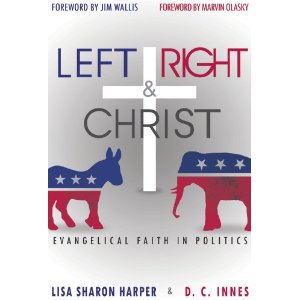 Left, Right & Christ: Evangelical Faith in Politics Lisa Sharon Harper & D.C. Innes (Russell Media) $22.99 As the election season proceeds I am sure I will revisit this often, drawing on each author’s important points as I write, teach, and talk about a Christian perspectives on politics. Perhaps it will serve you in such a way as well. As you might guess, this is a co-authored debate-style book, with a Christian who is a committed Democrat and a Christian who is a committed Republican each explaining how their faith and Biblical insights compel them to align themselves (even if always provisionally, as they both insist) towards more-or-less liberal or conservative public policies. D.C. Innes is a popular professor of political science at The Kings College in New York (and an Orthodox Presbyterian minister) while Ms Harper is an activist for Sojourners in DC who has worked with InterVarsity Christian Fellowship.
Left, Right & Christ: Evangelical Faith in Politics Lisa Sharon Harper & D.C. Innes (Russell Media) $22.99 As the election season proceeds I am sure I will revisit this often, drawing on each author’s important points as I write, teach, and talk about a Christian perspectives on politics. Perhaps it will serve you in such a way as well. As you might guess, this is a co-authored debate-style book, with a Christian who is a committed Democrat and a Christian who is a committed Republican each explaining how their faith and Biblical insights compel them to align themselves (even if always provisionally, as they both insist) towards more-or-less liberal or conservative public policies. D.C. Innes is a popular professor of political science at The Kings College in New York (and an Orthodox Presbyterian minister) while Ms Harper is an activist for Sojourners in DC who has worked with InterVarsity Christian Fellowship.
Marvin Olasky writes one forward to the LR&C; he is known for his insistence on a stauchly conservative Christian worldview (he writes often for World magazine) and he writes here “If this isn’t a conversation starter for Christians, than nothing else will be.” Jim Wallis of Sojourners has another forward, again noting that this book will certainly stimulate good discussion and deep thinking. I hope to write more carefully about this book in the future but don’t wait for my input. You get the point: this is ideal for book clubs, conversation-starters, to tweak our ideas by reading more than just one viewpoint, to give to that person who just doesn’t get your viewpoint. There are six or seven endorsements on the inside, each by folks I really respect (who hold to pretty diverse socio-political viewpoints, in fact, from Carl Trueman and John Anderson to Jonathan Merritt and Nicole Baker Fulgham. David Gushee says “One might have thought there was nothing new to say in or about this burnt-over disctrict, but in their sharp, yet civil, dialogue Innes and Harper offer provocative and creative new reflections.” Thanks to Mark Russell for his good work in shepherding this project and for designing such an attractive, clear, fair-minded, interesting, contemporary book. Here’s a fun video piece they did to capture the usefulness of this vibrant conversation. Enjoy.
Notice how the advertisement at the end says something like “wherever fine books are sold.” We would be one of those places. As I hope you know we care about these very fine books and stock them because we think they will helpful to you and yours. Let us know what you think, and use the handy link to the order for page if you’d want.
DISCOUNT
any book mentioned above
2O% off
order here
takes you to the secure Hearts & Minds order form page
just tell us what you want
inquire here
if you have questions or need more information
just ask us what you need to know
Hearts & Minds 234 East Main Street Dallastown, PA 17313 717-246-3333




 Work Matters: Connecting Sunday Worship to Monday Work by Tom Nelson (Crossway, 2011)
Work Matters: Connecting Sunday Worship to Monday Work by Tom Nelson (Crossway, 2011)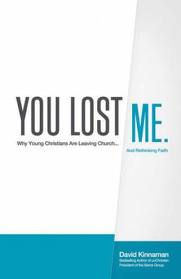 You Lost Me: Why Young Christians Are Leaving Church . . . And Rethinking Faith by David Kinnaman (Baker, 2011)
You Lost Me: Why Young Christians Are Leaving Church . . . And Rethinking Faith by David Kinnaman (Baker, 2011)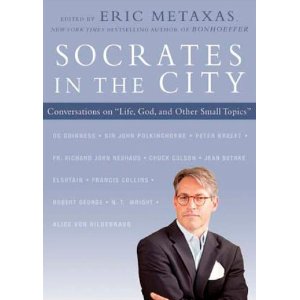 Socrates in the City: Conversations on “Life, God, and Other Small Topics” by Eric Metaxas, editor (Dutton, 2011)
Socrates in the City: Conversations on “Life, God, and Other Small Topics” by Eric Metaxas, editor (Dutton, 2011)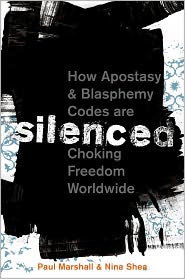 Silenced: How Apostasy and Blasphemy Codes are Choking Freedom Worldwide by Paul Marshall and Nina Shea (Oxford University Press, 2011)
Silenced: How Apostasy and Blasphemy Codes are Choking Freedom Worldwide by Paul Marshall and Nina Shea (Oxford University Press, 2011) church in Townsend, MD and researching titles we’ll take to a palliative care conference for nurses and hospice workers (sponsored by our local hospital) and I’m trying to work on book reviews that I do regularly for
church in Townsend, MD and researching titles we’ll take to a palliative care conference for nurses and hospice workers (sponsored by our local hospital) and I’m trying to work on book reviews that I do regularly for 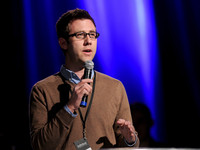 We are sponsoring “An Evening with David Kinnamon” hosted by the
We are sponsoring “An Evening with David Kinnamon” hosted by the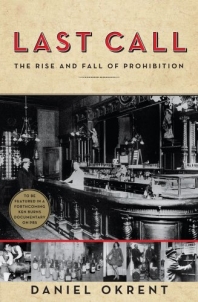 Last Call: The Rise and Fall of Prohibition Daniel Okrent (Scribner) $17.00 It was a bestseller in hardcover, the author has been awarded a Pulitzer, and this book is somewhat of a companion volume to the spectacularly interesting Ken Burn’s PBS documentary, Prohibition. You will notice that Okrent was in the film a bit–they are good friends. Glad this very readable social history is out in paper! Can’t tell you how interesting this is, how important, how informative and fascinating. Cheers!
Last Call: The Rise and Fall of Prohibition Daniel Okrent (Scribner) $17.00 It was a bestseller in hardcover, the author has been awarded a Pulitzer, and this book is somewhat of a companion volume to the spectacularly interesting Ken Burn’s PBS documentary, Prohibition. You will notice that Okrent was in the film a bit–they are good friends. Glad this very readable social history is out in paper! Can’t tell you how interesting this is, how important, how informative and fascinating. Cheers!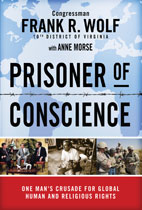 Prisoner of Conscience: One Man’s Crusade for Global Human and Religious Rights Congressman Frank R. Wolf (Zondervan) $22.99 If you were even somewhat moved by my serious review a few days ago of the scholarly research in Silenced (about blasphemy codes and Islamic apostasy laws) by Paul Marshall, which ruminates on the dangers of this crisis caused by the repressive Islamists willing to execute people for merely wanting to hold to their own faith or convictions, this exciting memoir will be sure to encourage. That is a masterpiece of analysis while this is a non-partisan story of a brave man and his remarkable adventures around the globe “where bullets fly and babies starve.” It reads quickly and puts you on the ground, documenting injustices and showing diplomatic and helpful contributions. Representative Wolf grew up poor in a tough neighborhood of Philly, with a severe stutter, bad grades, and mom who took him to Sunday School. He eventually got a degree from Penn State, got elected to Congress from the 10th district in Virginia, and is now one of the most effective voices in the world for human rights and freedom.
Prisoner of Conscience: One Man’s Crusade for Global Human and Religious Rights Congressman Frank R. Wolf (Zondervan) $22.99 If you were even somewhat moved by my serious review a few days ago of the scholarly research in Silenced (about blasphemy codes and Islamic apostasy laws) by Paul Marshall, which ruminates on the dangers of this crisis caused by the repressive Islamists willing to execute people for merely wanting to hold to their own faith or convictions, this exciting memoir will be sure to encourage. That is a masterpiece of analysis while this is a non-partisan story of a brave man and his remarkable adventures around the globe “where bullets fly and babies starve.” It reads quickly and puts you on the ground, documenting injustices and showing diplomatic and helpful contributions. Representative Wolf grew up poor in a tough neighborhood of Philly, with a severe stutter, bad grades, and mom who took him to Sunday School. He eventually got a degree from Penn State, got elected to Congress from the 10th district in Virginia, and is now one of the most effective voices in the world for human rights and freedom.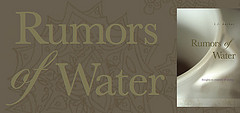 Rumors of Water: Thoughts on Creativity and Writing L.L. Barkat (T.S. Poetry Press) $15.00 This is one of the finest books on being a writer I’ve yet seen and a sharply observed bit of nearly devotional writing by a good friend, a tireless advocate for other writers, a brave, new publisher (though this indie press she started) and a Managing Editor at the popular
Rumors of Water: Thoughts on Creativity and Writing L.L. Barkat (T.S. Poetry Press) $15.00 This is one of the finest books on being a writer I’ve yet seen and a sharply observed bit of nearly devotional writing by a good friend, a tireless advocate for other writers, a brave, new publisher (though this indie press she started) and a Managing Editor at the popular 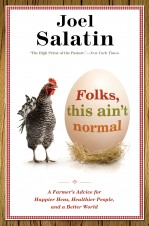 Folks, This Ain’t Normal: A Farmer’s Advice for Happier Hens, Healthier People, and a Better World Joel Salatin (Center Street) $25.99 Maybe you recall him from The Omnivore’s Dilemma or maybe you saw him in the documentary Food Inc. The New York Times called him “the high priest of the pasture.” Joe Salatin is a deeply religious, very jovial, and remarkably astute agronomist—that’s a fancy word for smart farmer, I think–who is convinced that we can all make a difference by working for reforms in our industrialized food systems–or at least in the way we buy and eat our own food. Remember Wendell Berry’s Mad Farmer poems? Maybe Salatin read them. Maybe they are about him, for all I know. Bill McKibben calls it “wonderfully cranky.” It is provocative and yet practical, by a guy who lives it. If you want to see the big picture and are willing to take some baby steps towards greater health, this is for you, whether you like chickens or not.
Folks, This Ain’t Normal: A Farmer’s Advice for Happier Hens, Healthier People, and a Better World Joel Salatin (Center Street) $25.99 Maybe you recall him from The Omnivore’s Dilemma or maybe you saw him in the documentary Food Inc. The New York Times called him “the high priest of the pasture.” Joe Salatin is a deeply religious, very jovial, and remarkably astute agronomist—that’s a fancy word for smart farmer, I think–who is convinced that we can all make a difference by working for reforms in our industrialized food systems–or at least in the way we buy and eat our own food. Remember Wendell Berry’s Mad Farmer poems? Maybe Salatin read them. Maybe they are about him, for all I know. Bill McKibben calls it “wonderfully cranky.” It is provocative and yet practical, by a guy who lives it. If you want to see the big picture and are willing to take some baby steps towards greater health, this is for you, whether you like chickens or not.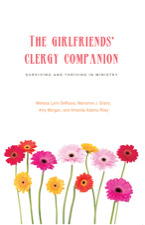 The Girlfriend’s Clergy Companion: Surviving and Thriving in Ministry Melissa Lynn DeRosia, Marianne J. Grano, Amy Morgan, and Amanda Adams Riley (Alban Institute) $17.00 I suppose you know that there has been in recent decades a large rise in the number of women clergy persons, mostly in mainline churches. Some of the very best pastors and preachers I know are women. Yet, there are not too many books about being a 21st century woman of the cloth. Most of these pastors/authors are youngish and they are wise and fun and helpful. They are Presbyterians. The book is very practical. If you are a woman in church work, you know you need this. If you have a woman on staff as a pastor at your church, you may want to get it for her. But read it first, yourself–it is helpful for us lay folks to realize what our clergy friends are going through. And don’t be surprised when these girlfriends start to dish a bit—short skirts? Pregnancy? Children and families? The Superwoman syndrome? How to command pastoral authority, deal with gender bias in otherwise healthy congregations? Discerning callings? It’s all here, and more. A wonderfully written forward by Carol Howard Merritt, too.
The Girlfriend’s Clergy Companion: Surviving and Thriving in Ministry Melissa Lynn DeRosia, Marianne J. Grano, Amy Morgan, and Amanda Adams Riley (Alban Institute) $17.00 I suppose you know that there has been in recent decades a large rise in the number of women clergy persons, mostly in mainline churches. Some of the very best pastors and preachers I know are women. Yet, there are not too many books about being a 21st century woman of the cloth. Most of these pastors/authors are youngish and they are wise and fun and helpful. They are Presbyterians. The book is very practical. If you are a woman in church work, you know you need this. If you have a woman on staff as a pastor at your church, you may want to get it for her. But read it first, yourself–it is helpful for us lay folks to realize what our clergy friends are going through. And don’t be surprised when these girlfriends start to dish a bit—short skirts? Pregnancy? Children and families? The Superwoman syndrome? How to command pastoral authority, deal with gender bias in otherwise healthy congregations? Discerning callings? It’s all here, and more. A wonderfully written forward by Carol Howard Merritt, too.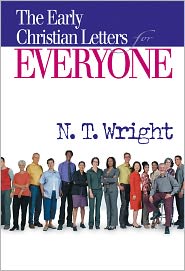 The Early Christian Letters for Everyone: James, Peter, John, and Jude N.T. Wright (Westminister/John Knox) $ 15.00 The “for everyone” series is a personal favorite, smallish and accessible but chock-full of Scriptural insight and teacherly assistance. Wright is a master of first century Judaism and the early Christian movement, so he knows the New Testament literature well. He has a wholistic Kingdom vision that just doesn’t quite, so we are especially eager to have folks read these. He’s almost done with the whole N.T. (with Revelation For Everyone coming soon.) These brief commentaries on epistles not claimed as Pauline make up some of the most important pieces of the formation of the early church. We need to know this stuff, through Wright’s good lens. Handy, easy, and really, really useful. Thanks be to God. By the way, Wright has companion small group Bible study guides to go with most of these, in the N. T. Wright for Everyone Bible Studies series from IVP ($8.00.)
The Early Christian Letters for Everyone: James, Peter, John, and Jude N.T. Wright (Westminister/John Knox) $ 15.00 The “for everyone” series is a personal favorite, smallish and accessible but chock-full of Scriptural insight and teacherly assistance. Wright is a master of first century Judaism and the early Christian movement, so he knows the New Testament literature well. He has a wholistic Kingdom vision that just doesn’t quite, so we are especially eager to have folks read these. He’s almost done with the whole N.T. (with Revelation For Everyone coming soon.) These brief commentaries on epistles not claimed as Pauline make up some of the most important pieces of the formation of the early church. We need to know this stuff, through Wright’s good lens. Handy, easy, and really, really useful. Thanks be to God. By the way, Wright has companion small group Bible study guides to go with most of these, in the N. T. Wright for Everyone Bible Studies series from IVP ($8.00.)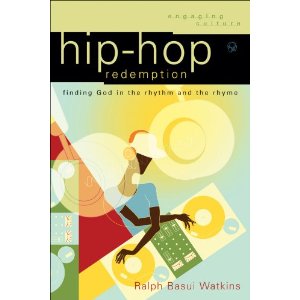 Hip-Hop Redemption: Finding God in the Rhythm and the Rhyme Ralph Basui Watkins (Baker) $17.99 There are two or three must-read bo
Hip-Hop Redemption: Finding God in the Rhythm and the Rhyme Ralph Basui Watkins (Baker) $17.99 There are two or three must-read bo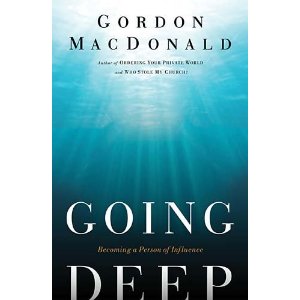 Going Deep: Becoming a Person of Influence Gordon MacDonald (Nelson) $15.99 I read everything this guy writes. He is a natural teacher and pastor inviting us to Godly lives, lived richly, drawing on who we are “below the surface.” Here he picks up the creative fiction style of the book he did about an imaginary church fighting over contemporary music and whatnot. (That was called Who Stole My Church and it was not hard to imagine at all, really.) He realizes that the people on both sides of that frustrating deadlock were, frankly, not deep. There were plenty of good people, plenty of sincere people, but not enough deep people. This just came but I cannot wait to read it.
Going Deep: Becoming a Person of Influence Gordon MacDonald (Nelson) $15.99 I read everything this guy writes. He is a natural teacher and pastor inviting us to Godly lives, lived richly, drawing on who we are “below the surface.” Here he picks up the creative fiction style of the book he did about an imaginary church fighting over contemporary music and whatnot. (That was called Who Stole My Church and it was not hard to imagine at all, really.) He realizes that the people on both sides of that frustrating deadlock were, frankly, not deep. There were plenty of good people, plenty of sincere people, but not enough deep people. This just came but I cannot wait to read it.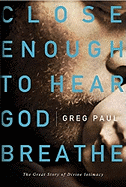 Close Enough to Hear God Breath: The Great Story of Divine Intimacy Greg Paul (Nelson) $15.99 I was blown away by this author’s earlier books about his raw ministry among the urban poor. (God in the Alley and The Twenty Piece Shuffle) so I was thrilled when I heard there was a new, creatively written study of God’s deep desire to be near us. Paul uses intense writing, moving prose and amazing stories—really!—and helps us, as he says, resist the “thousand voices telling me who I am. Or who I should be.” Only God gets to define who we are and this book will help, I’m sure of it. He uses stories from his own family background (to which many will be able to relate) and also from his own work with street people in Toronto. And, he uses the “creation-fall-redemption-restoration” vision of he unfolding drama of Scripture that many of us find so helpful. This guy has guts and clarity and yet has an enjoyably, creative prose style that is more than merely clever. This is a notable book by an important writer. Len Sweet says of it “This book has a heart that beats louder than most any book you’ll ever read.” How’s that for an endorsement?


Close Enough to Hear God Breath: The Great Story of Divine Intimacy Greg Paul (Nelson) $15.99 I was blown away by this author’s earlier books about his raw ministry among the urban poor. (God in the Alley and The Twenty Piece Shuffle) so I was thrilled when I heard there was a new, creatively written study of God’s deep desire to be near us. Paul uses intense writing, moving prose and amazing stories—really!—and helps us, as he says, resist the “thousand voices telling me who I am. Or who I should be.” Only God gets to define who we are and this book will help, I’m sure of it. He uses stories from his own family background (to which many will be able to relate) and also from his own work with street people in Toronto. And, he uses the “creation-fall-redemption-restoration” vision of he unfolding drama of Scripture that many of us find so helpful. This guy has guts and clarity and yet has an enjoyably, creative prose style that is more than merely clever. This is a notable book by an important writer. Len Sweet says of it “This book has a heart that beats louder than most any book you’ll ever read.” How’s that for an endorsement?

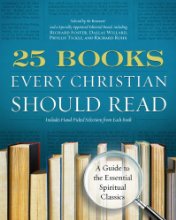 25 Books Every Christian Should Read: A Guide to Essential Spiritual Classics selected by Renovare (HarperOne) $18.99 This is the sort of book I just love and I’ll try to review it in greater detail soon. It is a very thorough review of each of the 25 books listed, explained and described, along with study aids, discussion resources and an excerpt of the book in question. Renovare, of course, is the contemplative spirituality ministry organized by Richard Foster so these are what is considered devotional classics. The subtitle is true. These choices and the apparatus developed to become familiar was led by a team of Richard Foster, Dallas Willard, Phyllis Tickle, and Richard Rohr. Several who helped were Gayle Beebe, Emilie Griffin, Frederica Mathewes-Green, John Wilson amongst others. Besides these top 25 books—-from On the Incarnation by St Athanasius to The Return of the Prodigal Son by Henri Nouwen—there are sidebars with many other authors listing their favorite 5 books. And an appendix listing some of the best authors writing today. Wow, this is a book-lovers delight, a must for anyone wanting to build a good library or who has a vocation of shaping or guiding others in their spiritual journeys. Highly recommended for our fans and friends.
25 Books Every Christian Should Read: A Guide to Essential Spiritual Classics selected by Renovare (HarperOne) $18.99 This is the sort of book I just love and I’ll try to review it in greater detail soon. It is a very thorough review of each of the 25 books listed, explained and described, along with study aids, discussion resources and an excerpt of the book in question. Renovare, of course, is the contemplative spirituality ministry organized by Richard Foster so these are what is considered devotional classics. The subtitle is true. These choices and the apparatus developed to become familiar was led by a team of Richard Foster, Dallas Willard, Phyllis Tickle, and Richard Rohr. Several who helped were Gayle Beebe, Emilie Griffin, Frederica Mathewes-Green, John Wilson amongst others. Besides these top 25 books—-from On the Incarnation by St Athanasius to The Return of the Prodigal Son by Henri Nouwen—there are sidebars with many other authors listing their favorite 5 books. And an appendix listing some of the best authors writing today. Wow, this is a book-lovers delight, a must for anyone wanting to build a good library or who has a vocation of shaping or guiding others in their spiritual journeys. Highly recommended for our fans and friends.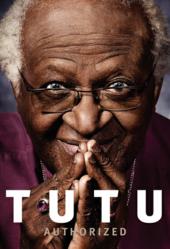 Tutu Authorized Allister Sparks & Mpho Tutu (HarperOne) $29.99 It isn’t every year we get to announce a “publishing event” but this is surely one, the mcuh-anticipated, eagerly- awaited authorized biography of the famous, South African Anglican leader. To appreciate the global and prominent nature the book, get this: the blurbs on the back are from Nelson Mandela, Bill Clinton, Kofi Annan, The Dalai Lama and the President of the United States. The forward is by Bono. This is very exciting and will tell his life story and rise to fame in a manner that is legitimate and well informed (one of the authors is his own daughter, Mpho.) It just came and a quick skim of the footnotes shows that the authors mention some things of great interest to me (Kuyper!) and some names I suspect would be important (like Stephen Biko and Alan Boesak and Alan Paton) so I’m impressed. Look at that cover, just look at that. This is a book many of our friends will want, and it is a book some of our friends might benefit from reading, even if they are not full fans of the Archbishop.
Tutu Authorized Allister Sparks & Mpho Tutu (HarperOne) $29.99 It isn’t every year we get to announce a “publishing event” but this is surely one, the mcuh-anticipated, eagerly- awaited authorized biography of the famous, South African Anglican leader. To appreciate the global and prominent nature the book, get this: the blurbs on the back are from Nelson Mandela, Bill Clinton, Kofi Annan, The Dalai Lama and the President of the United States. The forward is by Bono. This is very exciting and will tell his life story and rise to fame in a manner that is legitimate and well informed (one of the authors is his own daughter, Mpho.) It just came and a quick skim of the footnotes shows that the authors mention some things of great interest to me (Kuyper!) and some names I suspect would be important (like Stephen Biko and Alan Boesak and Alan Paton) so I’m impressed. Look at that cover, just look at that. This is a book many of our friends will want, and it is a book some of our friends might benefit from reading, even if they are not full fans of the Archbishop.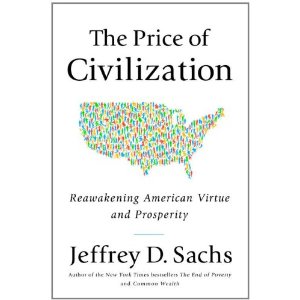 The Price of Civilization: Reawakening American Virtue and Prosperity Jeffrey D. Sachs (Random House) $27.00 I’m not gonna lie. This came today and I’ve barely cracked the cover. I read the acknowledgements and, yup, he’s really, really famous. And hangs with the world class leaders you have come to expect from his important work. (I hope you know his much-discussed The End of Poverty and the one called Common Wealth.) As you know, Sachs has spent his years as an economist working on global issues. Now he is alarmed about the “moral crisis” and “decline of civic virtue among America’s political and economic elites.”
The Price of Civilization: Reawakening American Virtue and Prosperity Jeffrey D. Sachs (Random House) $27.00 I’m not gonna lie. This came today and I’ve barely cracked the cover. I read the acknowledgements and, yup, he’s really, really famous. And hangs with the world class leaders you have come to expect from his important work. (I hope you know his much-discussed The End of Poverty and the one called Common Wealth.) As you know, Sachs has spent his years as an economist working on global issues. Now he is alarmed about the “moral crisis” and “decline of civic virtue among America’s political and economic elites.” 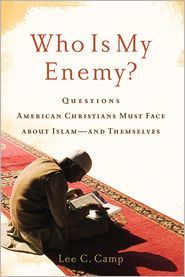 Islam—And Themselves (Brazos; $17.99) which examined faith-driven violence in both the Christian and Muslim past (and present.) Lee Camp astutely took up the questions about how faith has influenced state sanctioned violence and how the hard passages of the Bible and the Quran might be respected but kept from causing greater religious mayhem. That book was a Christ-centered radical call to a sort of discipleship that would bear fruits of peace-making and justice-seeking. I again recommend it heartily. Yet, even as we refuse to demonize our neighbors who are Islamic, we still have to admit that there are exceptionally dangerous things happening throughout the world in the name of Muhammad. For anyone who cares about human rights, it is urgent that we learn about the draconian forces of Islamic radicals and their effort to make leaving the Muslim faith (apostasy) or insulting Islam (blasphemy) illegal. It is so prevalent in so many places I believe we simply must admit that it is a humanitarian crisis and policy quandary of the highest order.
Islam—And Themselves (Brazos; $17.99) which examined faith-driven violence in both the Christian and Muslim past (and present.) Lee Camp astutely took up the questions about how faith has influenced state sanctioned violence and how the hard passages of the Bible and the Quran might be respected but kept from causing greater religious mayhem. That book was a Christ-centered radical call to a sort of discipleship that would bear fruits of peace-making and justice-seeking. I again recommend it heartily. Yet, even as we refuse to demonize our neighbors who are Islamic, we still have to admit that there are exceptionally dangerous things happening throughout the world in the name of Muhammad. For anyone who cares about human rights, it is urgent that we learn about the draconian forces of Islamic radicals and their effort to make leaving the Muslim faith (apostasy) or insulting Islam (blasphemy) illegal. It is so prevalent in so many places I believe we simply must admit that it is a humanitarian crisis and policy quandary of the highest order.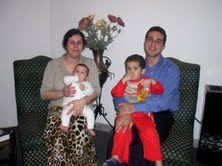 Many international leaders have renounced this awful violation of human conscience—executing someone merely because of what they believe!—-and yet it wasn’t until just a few days ago that the White House issued a protest. (Why Ms Clinton’s yelping about somebody throwing rotten tomatoes at a diplomatic limo seemed a more urgent story for the media this week is beyond me.) We should pray for our brother in Christ, and all those of any faith, or no faith, who are being persecuted for the sheer fact that they hold to a particular religious or philosophical conviction. Religious freedom should be a bed-rock, non-negotiable right. The greatest threat to religious freedom in nearly every continent today is radical Islam.
Many international leaders have renounced this awful violation of human conscience—executing someone merely because of what they believe!—-and yet it wasn’t until just a few days ago that the White House issued a protest. (Why Ms Clinton’s yelping about somebody throwing rotten tomatoes at a diplomatic limo seemed a more urgent story for the media this week is beyond me.) We should pray for our brother in Christ, and all those of any faith, or no faith, who are being persecuted for the sheer fact that they hold to a particular religious or philosophical conviction. Religious freedom should be a bed-rock, non-negotiable right. The greatest threat to religious freedom in nearly every continent today is radical Islam.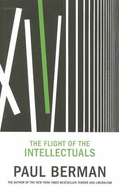 of conscious, but seems mostly absent in this struggle (see Paul Berman’s The Flight of t
of conscious, but seems mostly absent in this struggle (see Paul Berman’s The Flight of t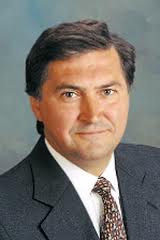 meaning of justice and jurisprudence, and how various worldviews and narratives shape different ways in which human rights are understood. (He wrote one of my all-time favorite books, which we still promote, called Heaven Is Not My Home: Living in the Now of God’s Creation; Nelson; $17.95.) His book God and the Constitution: Christianity and American Politics
meaning of justice and jurisprudence, and how various worldviews and narratives shape different ways in which human rights are understood. (He wrote one of my all-time favorite books, which we still promote, called Heaven Is Not My Home: Living in the Now of God’s Creation; Nelson; $17.95.) His book God and the Constitution: Christianity and American Politics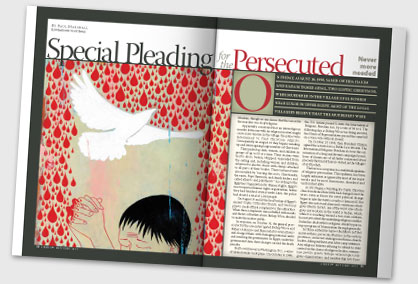 Christians in Egypt and other troubled spots. He has testified before Congress and lectured at the State Department. These previous books and essays—the scholarly work on a Christian philosophy of justice and rights and worldview, the work on Christian views of the government, and the human-rights reporting about religious persecution—all prepared him to undertake this massive, stressful work. Nina Shea is the Director of the Center for Religious Freedom and deserves equal credit as researcher, writer, and reporter. Her work is nearly unparalleled in this field. Here popular-level book, In the Lions Den (now out of print) was a gruesome but needed collection of first hand accounts of persecution and repression. In this new book Silenced, Marshall and Shea have given us a truly remarkable resource. Lives may be saved because of it. More just policies may be created. Greater tolerance and pluralistic civil societies may be supported. Let us hope this book and the struggle it documents, makes the world a better place.
Christians in Egypt and other troubled spots. He has testified before Congress and lectured at the State Department. These previous books and essays—the scholarly work on a Christian philosophy of justice and rights and worldview, the work on Christian views of the government, and the human-rights reporting about religious persecution—all prepared him to undertake this massive, stressful work. Nina Shea is the Director of the Center for Religious Freedom and deserves equal credit as researcher, writer, and reporter. Her work is nearly unparalleled in this field. Here popular-level book, In the Lions Den (now out of print) was a gruesome but needed collection of first hand accounts of persecution and repression. In this new book Silenced, Marshall and Shea have given us a truly remarkable resource. Lives may be saved because of it. More just policies may be created. Greater tolerance and pluralistic civil societies may be supported. Let us hope this book and the struggle it documents, makes the world a better place.